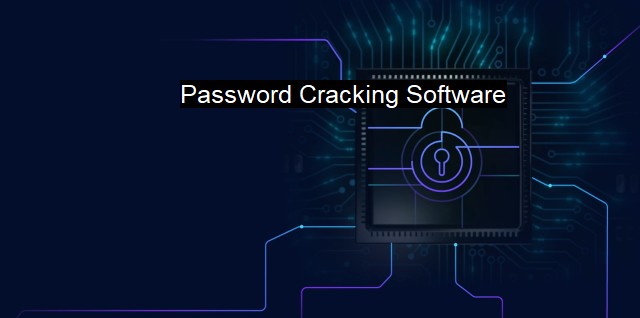What is Password Cracking Software?
The Vital Role and Misconceptions of Password Cracking Software in Cybersecurity: Exploring its Context, Potential and Diverse Applications
Password cracking software is an indispensable tool in the realm of cybersecurity and antivirus mechanisms, viewed from both offensive and defensive perspectives. Such software is fundamentally designed to decipher or bypass secret codes, often to access privately stored data or secure systems without proper authorization.From a surface-level viewpoint, "password cracking" may subtly hint canvassing of unscrupulous activities. on a deeper insight, password cracking software serves complex purposes that often exist more in alignment with endorsing cybersecurity rather than undermining it.
In the cybersecurity landscape, password cracking software often takes the form of advanced computational programs written to interpret and decrypt encoded data. They're designed with powerful algorithms to figure out the 'key,' or the specific input in a coded copy, that unlocks the original material.
From a functional perspective, it manipulates the encrypted information by using various deciphering strategies, the vast majority involving extensive 'guesswork.' For instance, the software might "brute force" the system, which implies arrogantly making innumerable random guesses until the rightly-fitted password is incidentally stumbled upon.
A more subtle method could involve "dictionary attacks", where the software repeatedly tries sequences from an existing list of commonly-used or possible passwords. This sequence pool could range from comprehensive databases of conventionally known password arrays to data extrapolated from specific users' data traces. Alternatively, it may attempt systematic 'keylogging' whereby keyboards' inputs are covertly recorded to capture unsuspecting users' password inputs.
Despite its seeming pervasive motive, password cracking software isn't solely purposed for malicious activities. In the arsenal of professional ethical hackers or cybersecurity experts often known as 'white hat hackers', password cracking software can be a fundamental tool. They use it to examine an organization's existing security systems, highlight potential vulnerabilities or weak spots, and subsequently offer robust solutions.
In the hands of these experts, password cracking software can help predict the efficiency, reliability, and overall resilience of allocated cybersecurity mechanisms. By probing defenses, they effectively ensure the password's strength, validate intrusion detection systems, test computer incident response plans, and more.
Alongside this is the role of password cracking software in antivirus structures. By simulating attacks and identifying system weaknesses, cybersecurity experts can proactively detect potential malware vulnerabilities or anomalies that might otherwise stay under the radar until exploited by real threats.
Antivirus systems armed with password cracking capacities are therefore better equipped to detect subtly disguised malware that may appear harmless. They form the stepping stone to developing powerful counter software to such external invasions.
Like all powerful technologies, password cracking software walks a critical difference between constructive use and misuse. While white hat hackers would use it to bolster security frameworks, malevolent entities exploit the software for unauthorized intrusion, surveillance perils, or worse, cybercrimes.
The evident possibility of misuse often ignites reinforcing the need for stringent legislation governing the use of such software. Users become increasingly encouraged to upgrade cybersecurity protocols, employ complex passwords, or resort to password management tools to stay safely ahead.
Password cracking software brings an intriguing dynamic to the entire cybersecurity ecosystem. Its potential to destabilize privacy, coupled with capabilities to boost security systems, necessitates striking a tricky balance between its utilization and regulation. Therefore, understanding its implications is crucial for companies and individuals alike to ascertain determined cyber threats mitigation and fortified internet safety measures.

Password Cracking Software FAQs
What is password cracking software?
Password cracking software is a tool used by cybersecurity experts to guess or crack passwords that have been encrypted or hidden. It helps test the strength of a system's security measures and identify any areas of weakness that can be exploited by hackers.Is password cracking software legal to use?
In most cases, password cracking software is legal to use for cybersecurity and antivirus purposes. However, using it to gain unauthorized access to a system or account is illegal and can result in severe legal consequences.What are some popular password cracking tools available in the market?
Some popular password cracking software tools include John the Ripper, Hashcat, Cain and Abel, Aircrack-ng, and Hydra. These tools have different features, capabilities, and compatibility, and are designed for different types of encryption or security systems.How can organizations protect themselves from password cracking attacks?
Organizations can protect themselves from password cracking attacks by using strong and complex passwords for their accounts, implementing multi-factor authentication, and regularly updating their security measures. They can also conduct regular security audits and penetration testing to identify vulnerabilities and address them promptly.| | A | | | B | | | C | | | D | | | E | | | F | | | G | | | H | | | I | | | J | | | K | | | L | | | M | |
| | N | | | O | | | P | | | Q | | | R | | | S | | | T | | | U | | | V | | | W | | | X | | | Y | | | Z | |
| | 1 | | | 2 | | | 3 | | | 4 | | | 7 | | | 8 | | |||||||